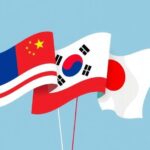China, South Korea, and Japan Strengthen Commitment to Free Trade
China, South Korea, and Japan have agreed to strengthen free trade in response to new U.S. tariffs. The meeting, the first of its kind in five years, aimed to accelerate negotiations for a trilateral free trade agreement and create a stable trade environment. Key trade officials emphasized the need for cooperation in facing shared global challenges while addressing the economic impacts of U.S. trade policies.
On Sunday, China, South Korea, and Japan convened to reinforce their commitment to free trade amidst the recent introduction of tariffs by U.S. President Donald Trump. This significant meeting, which was the first among top trade officials in five years, occurred just days prior to the enforcement of tariffs on many U.S. imports, including automobiles and components. South Korea and Japan, both major exporters of vehicles, along with China, have been adversely affected by these tariffs.
Key trade officials from the three nations—South Korea’s industry minister Ahn Duk-geun, Japan’s Yoji Muto, and China’s Wang Wentao—expressed their collective intent to hasten the discussions towards a comprehensive trilateral free trade agreement. They emphasized the necessity of fostering a “predictable trade and investment environment.” Minister Ahn urged a joint response to increasing global challenges, reflecting on the fragmented state of the current global economy.
Japanese trade official Yasuji Komiyama highlighted the pervasive uncertainties affecting international trade, stating, “The international environment surrounding us is constantly changing, and uncertainties are increasing.” Meanwhile, Wang Liping from China articulated the need to confront the rise of unilateralism and protectionism, while underscoring that these three nations represent a considerable share of the global economy and trade.
In light of the U.S. tariffs, which specifically target their automobile sectors, the implications for South Korea and Japan are dire. Ahn warned that South Korea relies heavily on U.S. markets, with 50% of its automobile exports directed there. Similarly, Japanese exports to the U.S. heavily feature vehicles, accounting for about one-third of its total projected exports worth 21.3 trillion yen ($145 billion) in 2024.
Despite historical tensions and grievances, Japanese Minister Muto expressed optimism for ongoing cooperation, stating that political difficulties should not hinder economic interactions. He stressed the importance of fields like energy security and essential mineral resources amidst shared global challenges. Previous disputes, particularly over wartime history, remain an underlying concern, complicating bilateral relations but not extinguishing the prospects for collaborative trade efforts.
The recent meeting between China, South Korea, and Japan signifies a vital step toward enhancing their trade relations in response to growing global economic challenges and U.S. tariffs. By striving for a trilateral trade agreement and addressing issues of protectionism, the three nations demonstrate a unified approach to maintaining stability and predictability in international commerce. Their collaboration, despite historical tensions, holds significant promise for bolstering their economic resilience in an increasingly fragmented global economy.
Original Source: www.vtcng.com








Post Comment